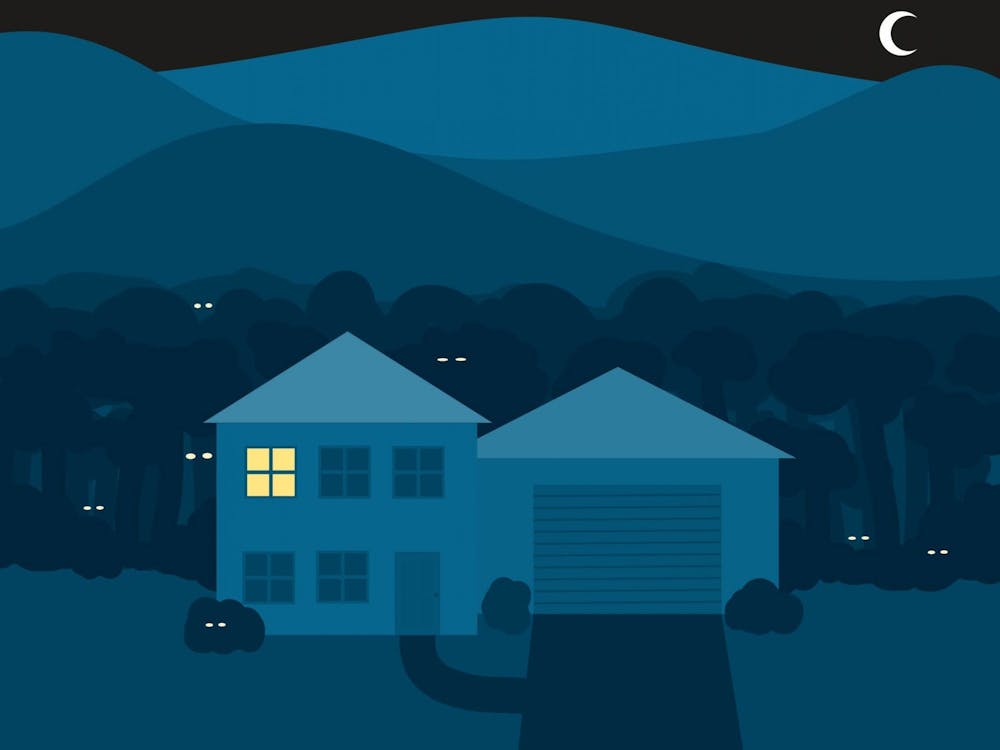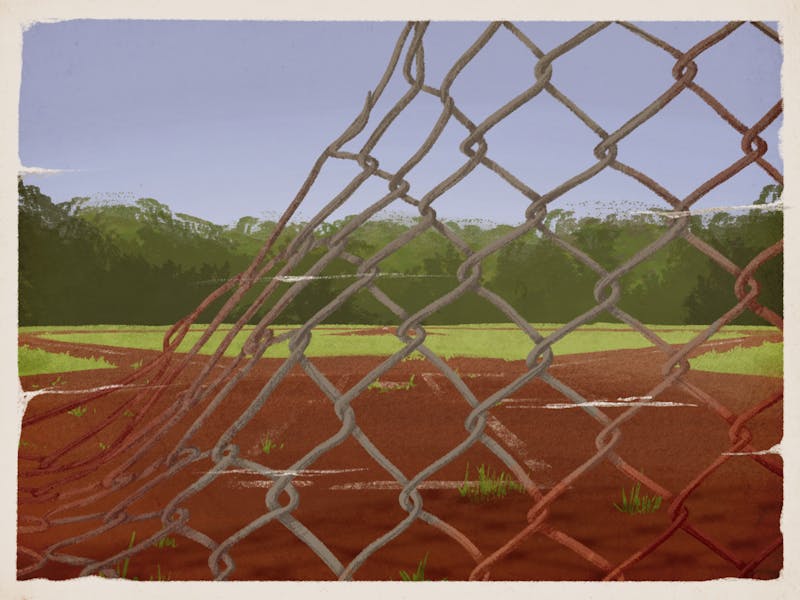My great aunt Sarah lives in a turquoise house by the road because she is a practical person— turquoise to scare off the evil things, away from the woods to avoid where they lurk. I live there too, for now. All the bedrooms sit at the front of the house, the windows facing the street. After nightfall, we don’t venture to the back half of the house, where the windows instead look out into the woods and the hills.
Here, even seeing or being seen can be deadly. Sarah is quick to warn about averting your eyes, ignoring whatever you think you may or may not have witnessed. Me, I’m most unsettled by the “being seen” part. Being seen and not realizing it, or only realizing it when it’s already too late.
I do not sleep well at Sarah’s house, but I sleep better than at home.
On Sundays, we wake up at sunrise for the early service at Green Aisle Baptist. Sarah opens the blinds to let the light in. She puts on the coffee and scuffles around in her slippers and robe, humming the hymns she hopes to hear later. She asks me what dress I’m wearing, and even though I only have three to choose from, she always nods and says, “I like that one.” She’s a singer and a talker, which is good because I’m neither. It fills the house with a much-needed something.
The name of Green Aisle is a bit deceptive, seeing as the aisle is actually light blue carpet. Apparently, the wood underneath is painted green from the olden days, but that’s probably a myth. I don’t know. When I lived in town with Momma and Jacob, Momma’d take my brother and me to the Saturday service at Saint Anthony’s in the city. It was our weekly escape, though the fact that it was an evening service meant we had to drive home in the dark. That wasn’t a problem for Momma—she wasn’t afraid of the woods and the night like Sarah. Not the woods, anyway, the outdoors. Not the unseen, the inhuman.
But I really don’t mind Green Aisle. The people are nice enough, even though I can hear in their tone and see in their eyes the things they refrain from saying. I find it a bit funny, actually, how they squirm, holding it all back. No one in towns like these ever says what they’re thinking to your face. I don’t say what I think, either, but it’s different. I don’t want to. I have nothing to say to the tight-lipped women in their hats, with their Bibles and the children that cling to their white legs. They fancy themselves close to Jesus, ever closer with every little, gnawing thing they don’t say.
Where do those things go, I might ask them if I really felt like it. To float around gossip circles, or die in diaries or maybe just bury deeper into your heart and stomach? You don’t have to live like that, I might say. Ask me about my mother, about my brother. Ask me how I survived, how I came to live with my great Aunt Sarah, how I came to be here, in your congregation, looking you in the face and smiling at you while you smile back—a lie, a dirty, two-way lie, this show we put on for each other. Ask me about the goddamn thing. Tell me how you feel, how relieved you are that it was mine, my family, and not yours. I’ll tell you that it might be, one day. I’ll tell you how that Bible isn’t keeping you and your pasty legs and your tight-lipped children safe. That’s what I might say if I really wanted to.
But I don’t.
Sarah and I take our seats together next to the Jamisons. Mrs. Jamison, leaning around her eldest, Luke, gives us a polite little wave before disappearing back behind his tall frame. Luke rolls his eyes at me, and I stick my tongue out at him. His face is very serious, very angry, and then, he smiles. I smile back. This is our routine.
He whispers something to his mother then shuffles past his sisters and Sarah to get to me at the end of the pew. He sits down as the organist starts to play.
We don’t dare speak as Pastor Tom gets on stage to sift through his sermon notes, but Luke slips a little pencil from the pocket of his church khakis and passes it to me stealthily. As long as Sarah doesn’t get up, his mother and sisters won’t be able to see us communicating via the “Notes” pages at the back of his Bible. Sarah, completely aware, thankfully just doesn’t care. Maybe there will be a day when she stops feeling sorry for me and tightens up more. As it is, I think she’s just glad I have a friend.
Mrs. Jamison doesn’t like me much, seeing as I’m cursed. She thinks I’m going to marry her only son and bring my misfortune to her family as if they don’t have enough on their own. And, in her mind, it isn’t a question of if we get married, either—it’s a question of when. It’s hard to convince people around here that we’re really, really just friends. It usually goes something like this:
“Something something…. you and your boyfriend… what’s his name?”
“Luke, but we’re not boyfriend and girlfriend.”
“Well, whatever you kids are calling it these days.”
“No, really; we’re just friends.”
“Oh sure, okay, well that’s nice, I suppose. That’s nice… for now. You never know.”
And then we leave it at that because I don’t want to explain it. I don’t care enough to explain that he’s just the only person in town who isn’t insufferable. I don’t care to explain that he reminds me of my brother, his sensitivity and humor and the way he finds amusement in everything. I don’t explain that he thinks my life is interesting and tragic, not that I’m possessed or cursed or a harbinger of sin and doom.
I can’t. And I can’t say that I like that he swears and watches the same movies as me and likes to shit-talk all the church ladies behind their backs. I can’t say it’s refreshing, how he calls himself an atheist because he doesn’t like the way Pastor Tom talks about Jesus. I can’t tell them that I like that he doesn’t treat me like other people, like they do, like I’m fragile and dangerous and broken; because, like everyone else in this godforsaken town, he’s broken, too, except he isn’t afraid to admit it. No, that wouldn’t do any good to clear up.
So, we’ll let them think what they think and say what they say. Sure, we’re boyfriend and girlfriend, deeply in love, planning a completely normal future together. Sure, we’re just like all of you, all neat and tidy in our Sunday best. Sure, we want what you want and think how you think and love how you love. Sure. Whatever helps you wrap your little brains around us.
But I shouldn’t talk about them like that. They aren’t all stupid, just misguided. Scared. There’s nothing—nothing—in the daylight or moonlight or pitch-black night that doesn’t scare everyone here. Fear keeps all the cogs turning.
I realize suddenly that I’ve zoned out during Pastor Tom’s sermon. I look down and Luke’s written:
Where are you at?
Momma hated that phrase. The “at” is unnecessary, but people here use it all the time. I take the pencil stub from him and scribble it out so it just says:
Where are you?
Where am I. Where am I ever.
I smirk at Luke, who rolls his eyes.
Grammar nerd, he writes aggressively.
I shrug and turn back to face the stage. We all rise for America the Beautiful. End of service.
Luke and I part in the parking lot, and Mrs. Jamison sends us another one of her nice little waves as she leads her two daughters away, her arms around each of their shoulders like a yoke. Luke trudges after them through the gravel, stopping to blow me a kiss before he gets into the car, parked at the wood's edge. The kiss is an inside joke of ours, part of the performance. Give the people what they want.
I stand alone in the lot and watch Luke's face through the passenger-side window, his hand raised in farewell as the little coupe pulls out and away in a cloud of gray dust. I wave in response until it's just the back of the car facing me, making its way down the road. Four little eyes stare back at me out of the rear windshield, watching. I drop my hand and stand, frozen until the car disappears behind a hill.
It's just the Jamison sisters, I remind myself. Just Luke's nosy sisters. But I stare straight ahead, ignoring the woods in my peripheral vision, ignoring the sway and hum of the trees in my ear, a presence heavy against my neck like a hot breath. I repeat an old mantra: It's all in your head. It's always been in your head. It's all in your head. It's always been in your head. Like slow tapping against Momma's moving car window, a warped gaze through the glass in the dark, the screech of wheels on wet asphalt, screech of something else, something other in the night. We weren't able to recover any bodies.
It's all in your head. It's always been in your head. It's all in your head. It's always been in your he—
Something grasps my shoulder and I startle, hard, turning to face it. Aunt Sarah shrinks back from me.
"I'm sorry—" we say at the same time, but I can barely breathe, barely spit it out.
"I'm sorry," she says again. "I should've known better." I stare at her kind face, the worry there, and my shoulders drop. I realize, suddenly, that I'm holding back tears. I'm not doing a very good job.
"It's okay," I manage to say. I breathe deep. The trees are still. I turn to face them. After a moment, Sarah reaches out again, gingerly, to lay her hand on my shoulder.
"It's just in my head," I say, out loud this time. Then, to Aunt Sarah, "It's just in my head." My feet are planted in the gravel, eyes burning, weight on my chest and shoulders. I stare at her, waiting for a reassurance that doesn't come. "It's just in my head."
I'll say it till it's true.



